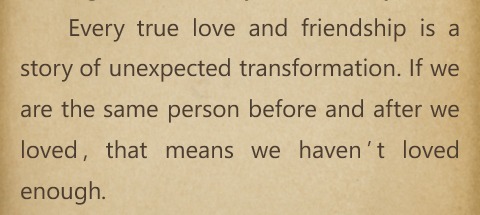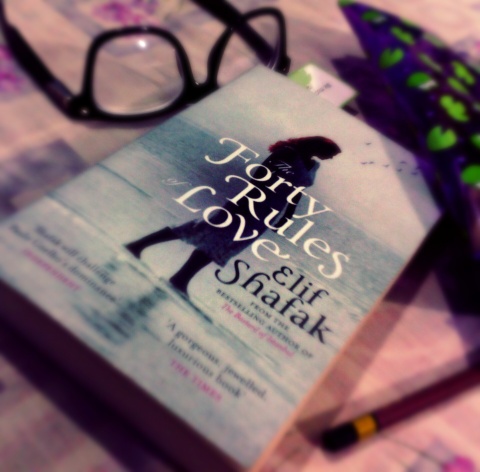Book: The Forty Rules of Love: A Novel about Rumi
Author: Elif Shafak
Year: 2010
Bookhad Rating: ❤❤❤❤♡
This is my third Elif Shafak book, therefore, by common assent, it must be agreed that she is a writer I love to read. Before reviewing this book for language, story, reader immersion, and the likes I will spend some line recommending Elif Shafak. It only seems necessary. Elif Shafak is one heck of a writer to put it bluntly. A woman who shuttles between Turkey and the US, she writes about both worlds with equal aplomb. As for me, every time I have read Shafak describing Turkey it has made me want to go there. Her writing is tidal – it sweeps you away into a world of literature – and there, I think, she wins as a writer. That’s what the whole deal is, right? To take you to a different world and tell you a story. Elif Shafak can do that and that explains why I am done reading three books of hers and will be onto the fourth The Flea Palace shortly.
 The Forty Rules of Love is not a self-help book. Far from it. It’s not preaching anything. It won’t ask you to rearrange yourself. There. Now I have that out of the way. This book is a story about people living in different centuries and how they coincide in one definitive sweep. Ella Rubenstein is a housewife who has a templatized life – a wavering husband, three children, a dog, cooking skills, and a house with a garden. She is every bit the meticulous housewife, who cooks delicious food for the family, ignores her husband’s affairs, takes the customary dinner with her husband as a disguise for love, and attends cooking classes. At forty, Ella takes up a job with a literary agent as a reader. Her first assignment comes on the day her daughter announces her wedding with her non-Jewish boyfriend. Ella objects to the marriage citing cultural differences and the unimportance of love in a marriage, which cause a rift between her daughter and her. Also, what she says on the dinner table leaves a bad taste in her husband’s mouth. No one to go to, she retreats to reading the manuscript assigned to her titled Sweet Blasphemy. Thus starts, Ella’s journey to Konya of the 13th Century where she follows the life of the wandering dervish Shams of Tabriz and his search for a companion who will take on his learnings.
The Forty Rules of Love is not a self-help book. Far from it. It’s not preaching anything. It won’t ask you to rearrange yourself. There. Now I have that out of the way. This book is a story about people living in different centuries and how they coincide in one definitive sweep. Ella Rubenstein is a housewife who has a templatized life – a wavering husband, three children, a dog, cooking skills, and a house with a garden. She is every bit the meticulous housewife, who cooks delicious food for the family, ignores her husband’s affairs, takes the customary dinner with her husband as a disguise for love, and attends cooking classes. At forty, Ella takes up a job with a literary agent as a reader. Her first assignment comes on the day her daughter announces her wedding with her non-Jewish boyfriend. Ella objects to the marriage citing cultural differences and the unimportance of love in a marriage, which cause a rift between her daughter and her. Also, what she says on the dinner table leaves a bad taste in her husband’s mouth. No one to go to, she retreats to reading the manuscript assigned to her titled Sweet Blasphemy. Thus starts, Ella’s journey to Konya of the 13th Century where she follows the life of the wandering dervish Shams of Tabriz and his search for a companion who will take on his learnings.
The book shuttles between Northampton of 2008 and Konya of the 13th Century telling two stories. While Ella reluctantly reads the book as an assignment, she begins to reassess her life and her passivity. And while Shams of Tabriz communicates with the universe, somewhere a Mawlana Jalal-ud-din Rumi is waiting to learn more about life and how to live it. Ella strikes up a conversation with the writer of Sweet Blasphemy, Aziz Zahara, who tells her his journey to Sufism and why he wanted to write just one book – this one. As the book progresses, one can see the turn Ella’s life takes and how Shams of Tabriz completes his mission of passing on the knowledge the Lord bestowed on him.
The book is narrated by many people as is Shafak’s style, and truth be told it is easy to follow and gives so much perspective. Ella’s parts are written in third person, while the story of Shams of Tabriz is narrated by Shams, Rumi, a harlot, a leper, a drunk, a zealot, Rumi’s sons, wife Kerri, and daughter Kimaya. It would seem daunting, but the fact that it’s done so well is the saving grace. The writing is effortless and the wisdom isn’t jutting out and onto your face. n this book Shams of Tabriz ruffles a lot of feathers by challenging convention, mixing with harlots and drunks, and plainly questioning people who follow customs blindly. On the other hand, Ella slowly questions her own life and allows herself to understand her daughter, and finally seeks love for herself.
Read The Forty Rules of Love to experience spirituality in a non-complex form and for its many fables. The book is sprinkled with fables that have come down the ages. Some people argue that the Sufi depiction of Islam is incorrect. Although I wouldn’t know as I am not an expert, I think it would be good to note that the book is not prescriptive. Like any other story you take away what resonates with you.
I’m thinking that there is a lot to take away.
Bookhad
(06. 01. 2014)



Leave a comment